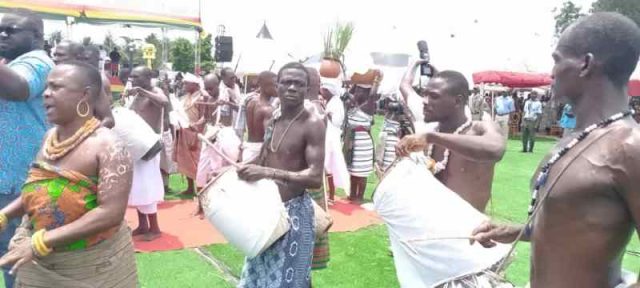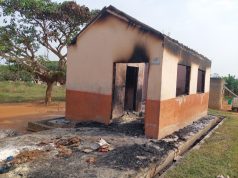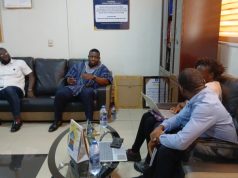By Edzorna Francis Mensah
Torgbuiga Adamah III, the Makorsor of the Somē Traditional Area in the Ketu South Municipality, has expressed sadness about the excessive use of harmful drugs among the youth, especially young women within the area.
He noted that the alarming rise in drug abuse among the youth in and around the Agbozume area, as well as other fast-growing communities under his jurisdiction, is leading to prostitution, teenage pregnancy, school dropouts, and petty crimes.
Torgbiga, who was addressing his subjects and other dignitaries during the grand durbar of the 2024 Sometutu Za on 28th September, mentioned that, “unfortunately, some of these acts are happening under the protection of certain law enforcement personnel within the Traditional Area.”
He also highlighted the need for unity among all stakeholders, in line with the theme for the celebration, “Sustaining the Peace and Unity of Somé for Development,” while acknowledging the increasing disunity between assembly members, which is hampering community development. He remarked that chiefs have neglected their responsibilities, leaving assembly members to manage community needs.
According to him, Agbozume, the capital of the Somé Traditional Area, has been without water for over a year. “Despite my numerous efforts to resolve this issue, including meetings with Ghana Water Company management, no solution has been forthcoming. This has led to frustration and misunderstanding among our people, who mistakenly believe we are indifferent to their suffering.”
Torgbiga also lamented the poor internal road network and inadequate educational infrastructure, particularly at Somé High Secondary School.
Looking forward, Torgbiga stated that, together with his chiefs, they will declare the drug abuse situation a security threat and called on security agencies to assist in addressing the issue.
Historical Background of the Somé State: The Founding of Somé
The people now called Soméawo were once part of the Ewe group that lived in Egypt, Sudan, and the empires of Ghana, Mali, and Songhai. Later, they settled at the confluence of the Niger and Benue rivers, in a place called Ketu (present-day Nigeria). At Ketu, they were known as Ketawo because they had settled at the “head of the sand.”
In those days, the Ketawo were fishermen, farmers, and kete weavers, having learned kete weaving from the Arabs with whom they traded. In the early sixteenth century, the Ewe groups of Ketu moved southwestward and eventually settled at Notsie—an area in present-day Togo along the Lomé-Atakpamé road.
The ruler of Notsie at that time was Torgbi Agor Akorli/Agorkorli, a descendant of one of the migrant kings of Ketu. His reign was noted for its rigidity and inhumane treatment of his subjects. Weary of the alleged ill-treatment and the impossible tasks imposed by King Agorkorli, the Ewe groups decided to leave the walled city in search of new homes.
Plans were drawn and followed to the letter, and on the appointed day, the people left Notsie—leaving King Agorkorli to wake up to an almost empty city. The Ketawo had left Notsie earlier than the other Ewe groups.
Upon reaching Tsevie (also in present-day Togo), the Ketawo moved westward under the leadership of King Nukpornuku (a grandson of Agorkorli) and eventually settled at Ayidiga, along the Keta Lagoon, about three miles north of present-day Anlo Afiadenyigba. However, Ayidiga proved unsuitable due to its distance from the lagoon and sea and its vulnerability to periodic floods, prompting the Ketawo to leave once more.
The Ketawo traveled in their usual three-wing formation: Agudza/Agudzasor (Left Wing), Kpordiwlor/Kporluwor (Right Wing), and Amukoe (Center – the King’s Wing). They eventually settled and built Keta in 1650. From Keta, the Ketawo established other settlements, and at one time, the power of King Nukpornuku stretched from Agorko to Detsiɖeke in Tegbi.


















